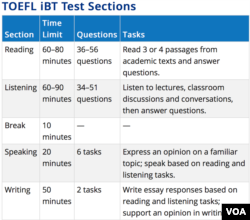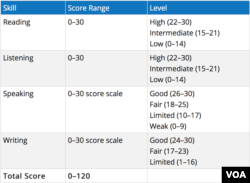Students applying to American universities have to submit test scores to show they have achieved proficient levels of education. The major tests are the SAT, ACT and TOEFL exams.
Standardized tests help universities assess and compare the students' abilities. Colleges use the results to determine if a student academic department or program at the school.
If you get test anxiety and do not perform to the best of your abilities on standardized tests, know that you can take them again. Also, the scores are one of many elements in the college application process. Universities also look at your Common App, essays, letters of recommendation, résumés, interviews, transcripts and grade-point average (GPA) to determine admission.
But, yes, they are important, so prepare, study and sleep the night before the test.
Here is what you need to know about the TOEFL.
The TOEFL -- Test of English as a Foreign Language -- is one of the most important standardized tests that international students are required to take.
The TOEFL is used by more than 9,000 universities in over 130 countries to assess English language proficiency for non-English language speakers, according to ETS. International Student states, “Schools look to the TOEFL as one of their earliest indicators to see if a foreign student is ready to study in the U.S.” The TOEFL is administered by ETS (Educational Testing Service) as an internet-based test [IBT] and sometimes paper-based test [PBT].
Over 30 million students have taken the TOEFL, according to ETS. Typically, students who are planning to study at a higher education institution in the States and student-workers applying for visas take the TOEFL.
The internet-based TOEFL has four sections that take about four and a half hours to complete from check-in to finish. The skills tested during the TOEFL are listening, reading, speaking and writing. The test combines these skills to evaluate your performance.
Below is a chart from ETS that breaks down the TOEFL test sections.
The TOEFL is scored on scale of 0 to 30 for each of the four sections for 120 possible points.
Below is another chart from ETS that explains TOEFL Score Scales.
According to ETS, you will also receive performance feedback when you get your score report. Scores are also valid up to two years from the date you took the exam.
Like SAT and ACT scores, universities have their own score requirements for admission. So make sure you research the minimal and average score your application schools typically accept.
Unlike the SAT or ACT, the TOEFL is administrated online and offered more than 50 times per year. To find an available authorized testing center and dates near you, create a TOEFL IBT account and click "Register for a Test.” You do not have to actually register for a test to view available centers and dates.
You can take the TOEFL as many times as you want. The only restriction is that you can’t take it more than once in a 12-day period. This is because you can’t register for another exam date that is within 12 days of your scheduled date.
There are three different ways to register for the TOEFL: online, by mail or over the phone.
Online: You can register online 24 hours a day, seven days a week. Just make sure the name you use to register matches the ID you bring to the tests site.
By Phone: Before you call to register make sure you check out this Registration Form. Then use this tool to find the number to call in your Regional Registration Center [RRC]. Then, follow the directions once you call the center. The ETS site states that “Late registration by phone closes at 5 p.m. local test center time on the business day before the test and has a late fee of $40.”
By Mail: First print and fill out the Registration Form. Then pick your form of payment. (See the options below.) Forms must be received by the Regional Registration Center four weeks before your test date. If you do not get a confirmation that the RRC has received your form and payment three days prior to the deadline, call the RRC. Another aspect about registering by phone or mail is making sure you provide the right codes on the form. To make sure you are submitting the right codes, check out this tool.
Payment methods include credit/debit card -- American Express, Discover, MasterCard, or VISA -- Paypal account or an electronic check if your account is from the U.S. or its territories.
Keep in mind that registration closes seven days prior to the test date and that the late registration closes four days before the test date and will cost you $40 extra.
The fees per test often vary based on where you are taking the exam. The average price in the United States is $190. To see exactly how much these tests will cost you use this tool from ETS.
Keep in mind there are also fees for sending scores to universities which can add up pretty fast so make sure the scores you are sending out are impressive.
Always be prepared for your tests. Take advantage of free practice tests found online, purchase workbooks to improve your test taking skills or even find prep courses taught by local teachers. Remember to get a good nights sleep, eat a balanced breakfast and bring extra pencils to your testing center.
Have you taken SAT? ACT? TOEFL? What advice do you have for others? Please leave a comment below and on our Facebook page.
Standardized tests help universities assess and compare the students' abilities. Colleges use the results to determine if a student academic department or program at the school.
If you get test anxiety and do not perform to the best of your abilities on standardized tests, know that you can take them again. Also, the scores are one of many elements in the college application process. Universities also look at your Common App, essays, letters of recommendation, résumés, interviews, transcripts and grade-point average (GPA) to determine admission.
But, yes, they are important, so prepare, study and sleep the night before the test.
Here is what you need to know about the TOEFL.
The TOEFL
The TOEFL -- Test of English as a Foreign Language -- is one of the most important standardized tests that international students are required to take.
The TOEFL is used by more than 9,000 universities in over 130 countries to assess English language proficiency for non-English language speakers, according to ETS. International Student states, “Schools look to the TOEFL as one of their earliest indicators to see if a foreign student is ready to study in the U.S.” The TOEFL is administered by ETS (Educational Testing Service) as an internet-based test [IBT] and sometimes paper-based test [PBT].
Over 30 million students have taken the TOEFL, according to ETS. Typically, students who are planning to study at a higher education institution in the States and student-workers applying for visas take the TOEFL.
What does the TOEFL test?
The internet-based TOEFL has four sections that take about four and a half hours to complete from check-in to finish. The skills tested during the TOEFL are listening, reading, speaking and writing. The test combines these skills to evaluate your performance.
Below is a chart from ETS that breaks down the TOEFL test sections.
How is the TOEFL scored?
The TOEFL is scored on scale of 0 to 30 for each of the four sections for 120 possible points.
Below is another chart from ETS that explains TOEFL Score Scales.
According to ETS, you will also receive performance feedback when you get your score report. Scores are also valid up to two years from the date you took the exam.
Like SAT and ACT scores, universities have their own score requirements for admission. So make sure you research the minimal and average score your application schools typically accept.
When can you take the TOEFL?
Unlike the SAT or ACT, the TOEFL is administrated online and offered more than 50 times per year. To find an available authorized testing center and dates near you, create a TOEFL IBT account and click "Register for a Test.” You do not have to actually register for a test to view available centers and dates.
You can take the TOEFL as many times as you want. The only restriction is that you can’t take it more than once in a 12-day period. This is because you can’t register for another exam date that is within 12 days of your scheduled date.
There are three different ways to register for the TOEFL: online, by mail or over the phone.
Online: You can register online 24 hours a day, seven days a week. Just make sure the name you use to register matches the ID you bring to the tests site.
By Phone: Before you call to register make sure you check out this Registration Form. Then use this tool to find the number to call in your Regional Registration Center [RRC]. Then, follow the directions once you call the center. The ETS site states that “Late registration by phone closes at 5 p.m. local test center time on the business day before the test and has a late fee of $40.”
By Mail: First print and fill out the Registration Form. Then pick your form of payment. (See the options below.) Forms must be received by the Regional Registration Center four weeks before your test date. If you do not get a confirmation that the RRC has received your form and payment three days prior to the deadline, call the RRC. Another aspect about registering by phone or mail is making sure you provide the right codes on the form. To make sure you are submitting the right codes, check out this tool.
Payment methods include credit/debit card -- American Express, Discover, MasterCard, or VISA -- Paypal account or an electronic check if your account is from the U.S. or its territories.
Keep in mind that registration closes seven days prior to the test date and that the late registration closes four days before the test date and will cost you $40 extra.
The fees per test often vary based on where you are taking the exam. The average price in the United States is $190. To see exactly how much these tests will cost you use this tool from ETS.
Keep in mind there are also fees for sending scores to universities which can add up pretty fast so make sure the scores you are sending out are impressive.
Always be prepared for your tests. Take advantage of free practice tests found online, purchase workbooks to improve your test taking skills or even find prep courses taught by local teachers. Remember to get a good nights sleep, eat a balanced breakfast and bring extra pencils to your testing center.
And remember, it's only a test it does not define who you are or your intelligence.
Have you taken SAT? ACT? TOEFL? What advice do you have for others? Please leave a comment below and on our Facebook page.





